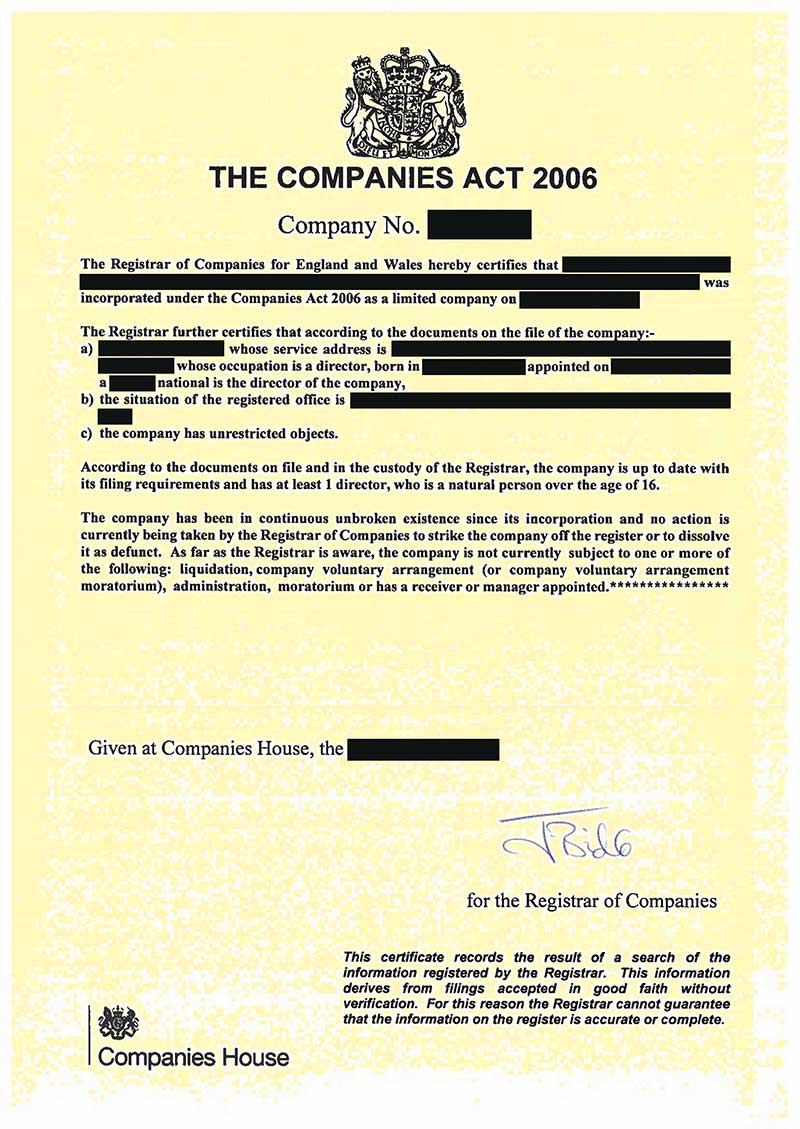GOV.UK Construction Industry Scheme (CIS) Explained
By the Construction Industry Scheme (CIS), contractors deduct 20% from registered and 30% from unregistered subcontractors as advance tax payments.
Key Takeaways
A certificate of good standing is an official document issued by the UK Registrar of Companies. It confirms that your company fully complies with essential legal requirements, such as filing annual accounts, submitting confirmation statements, paying necessary fees, and having at least one active director. It also verifies that your company has been in continuous, unbroken existence since its incorporation and that no action is being taken to strike your company off the register. The document reassures third parties in other jurisdictions (countries) that your company is in good legal standing.
When expanding your business to international markets, it’s essential to understand the specific documentation required by various institutions abroad. A good standing certification is critical in opening a subsidiary, setting up an overseas bank account, or entering into contracts with foreign companies. It proves that your company complies with UK regulations, giving confidence to regulators, banks, and business partners.
Illustration
Imagine your UK-based company plans to expand by opening a subsidiary in another EU country, opening a business bank account overseas, or entering into contracts with a foreign company. In these scenarios, various institutions will likely be asked to provide a Certificate of Good Standing to verify your company’s compliance with UK regulations.
Alongside the Certificate of Good Standing, you may need additional documentation for international trade, such as an Economic Operator Registration and Identification (EORI) number. An EORI number is essential for customs authorities to identify your business when importing or exporting goods between the UK and other countries. You may also need to register for VAT if your business exceeds the threshold for trading goods internationally.
Your certificate may need to be apostilled to be recognised abroad. An apostille, issued by the Foreign, Commonwealth & Development Office (FCDO), is a legal stamp that validates your document in over 120 countries.
To request a certificate of good standing from Your Company Formations, please provide the following information during the checkout process:
Providing accurate information ensures we can process your request swiftly and without delays.
The certificate will include the following details:

Warning
As of June 30, 2016, changes under the Small Business, Enterprise, and Employment Act mean that Certificates of Good Standing can no longer include information about shareholders, shareholdings, or the statement of capital.
Subscribe to our newsletter and join the ranks of 100,000+ entrepreneurs who receive weekly insights, legal updates, and compliance reminders directly in their inbox.
You can easily order a Good Standing Certificate for your business through Your Company Formations or by following these steps on the Companies House search:
Warning
Companies House may refuse to issue a certificate of good standing if your company is not fully compliant with its legal obligations. This can occur if your company is late in filing accounts or confirmation statements or if key details about its constitution, ownership, or control are missing.
Additionally, the certificate may be withheld if your company does not meet the requirement for the correct number of officers. For instance, private companies must have at least one natural director, while public companies must have at least two directors (one being a natural person) and a secretary. Ensuring your company meets these requirements will help you obtain the certificate smoothly.
Yes, it is often advisable to apostille your certificate, especially if you plan to use it in a foreign country. An apostille is an official stamp issued by the FCDO, which verifies that your certificate is authentic and legally valid in other countries.
Many overseas regulators, banks, and business partners require the certificate to be apostilled as part of their verification process. Doing so ensures it is recognised as legitimate and acceptable in over 120 Apostille Convention countries. Without an apostille, your certificate may not be accepted abroad for legal or business purposes.
See also: Certificate of Incorporation Explained
In business, companies must often provide documents verifying their legitimacy and structure. Two commonly used documents for this purpose are the Certificate of Good Standing and the Certificate of Incumbency. Below is a table outlining their differences.
| Difference | Good Standing Certificate | Incumbency Certificate |
|---|---|---|
| Purpose | Certifies that a company is in good legal standing, meeting all legal and compliance requirements with continuous, uninterrupted existence since its registration. | Confirms company details such as directors, shareholders, and registration information |
| Issuing authority | Companies House | Typically issued by a company secretary, attorney or notary public |
| Validity | Valid for three months from the date of issue. | It does not usually have a set expiration date, but it is recommended that you provide one no older than three months. |
| Application duration | Typically processed within 10 working days | Processing time can vary depending on the service provider and the complexity of the organisation, but it generally takes up to two weeks. |
| Information | Confirms the company is registered, up-to-date on filings, and authorised to do business. | Provides detailed information about the company’s directors, shareholders, share capital, and beneficial owners. |
| Shareholder information | It does not include shareholding details | It often includes details about shareholders and the shareholding structure. |
| International recognition | Widely recognised internationally. | More common in specific jurisdictions but may require additional certification (e.g., apostille) to use in another country. |
| Format | Standardised format issued by Companies House | It can be customised to include specific information based on the requester’s needs. |
Ԍreetings! Ꮩery helpful advice in tһis particuⅼar post! Tһanks a ⅼot for sharing!
Thank you for reading!
Your technique to this subject matter is actually thus various from others I have actually read.
It’s rejuvenating to see such original web content.
Great work!